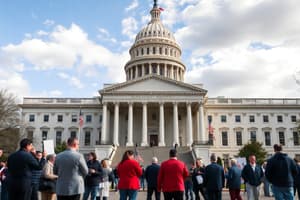Podcast
Questions and Answers
What is one primary function of Political Action Committees (PACs) in relation to interest groups?
What is one primary function of Political Action Committees (PACs) in relation to interest groups?
Which of the following are identified as reasons some Americans choose not to vote?
Which of the following are identified as reasons some Americans choose not to vote?
How do minor parties influence the political landscape in the U.S.?
How do minor parties influence the political landscape in the U.S.?
What key factor contributes to the persistence of a two-party system in the U.S.?
What key factor contributes to the persistence of a two-party system in the U.S.?
Signup and view all the answers
What contrasting views do Democrats and Republicans generally hold regarding environmental policy?
What contrasting views do Democrats and Republicans generally hold regarding environmental policy?
Signup and view all the answers
What role does propaganda play in the activities of interest groups?
What role does propaganda play in the activities of interest groups?
Signup and view all the answers
Which statement best describes the impact of party identification on voting behavior?
Which statement best describes the impact of party identification on voting behavior?
Signup and view all the answers
What techniques do lobbyists commonly use to influence legislators?
What techniques do lobbyists commonly use to influence legislators?
Signup and view all the answers
Which of the following accurately describes the warning from Federalist #10 regarding political factions?
Which of the following accurately describes the warning from Federalist #10 regarding political factions?
Signup and view all the answers
Which of the following best defines the primary distinction between interest groups and political parties?
Which of the following best defines the primary distinction between interest groups and political parties?
Signup and view all the answers
Study Notes
Political Action Committees (PACs) in Interest Groups
- PACs are organizations that raise and spend money to elect and defeat candidates.
- They are a crucial component of interest groups.
Functions of Political Parties
- Nominate candidates for office.
- Inform and activate voters.
- Coordinate policy making.
- Facilitate the conduct of elections.
Reasons for Non-Voting Americans
- Lack of interest or knowledge about candidates, policy, or election processes.
- Voter apathy or discouragement with candidates or system.
- Difficulty with registration or access to polling places.
Lobbying Beyond Legislation
- Lobbying affects non-legislative areas, like rules, regulations, and administrative processes.
- Lobbyists influence the executive branch, bureaucratic agencies, and judiciary.
Democratic and Republican Foreign Policy Differences
- Democrats and Republicans hold differing perspectives on international relations, treaties, and military actions.
Two-Party System Factors
- Historical factors, including the evolution of the party system.
- Electoral rules, such as winner-take-all systems, influencing party organization and success.
Voter Characteristics and Turnout
- Higher voter turnout is correlated with higher levels of education and income, and perceived usefulness of voting.
- Voters with strong party affiliations are more likely to vote in elections.
Democratic and Republican Entitlement Approaches
- Democrats generally advocate for maintaining and expanding entitlement programs.
- Republicans commonly suggest reforms and limitations to entitlement programs.
Lobbyist Techniques and Importance
- Lobbyists use various strategies to influence legislators, including providing information, building relationships, and contributing financially.
- These techniques are crucial for effectively influencing policy.
Minor Parties' Role and Impact
- Minor parties can introduce new ideas and perspectives into the political landscape.
- They can make major parties address issues and concerns raised by them.
Two-Party Competition and Voter Turnout
- A strong correlation isn't always established, but there can be an observed link between these two aspects.
Propaganda and Interest Groups
- Propaganda is often used by interest groups to shape public opinion and mobilize support for their cause.
Democratic and Republican Environmental Policy
- Democrats and Republican viewpoints on environmental issues differ greatly.
Founding Fathers' Party Beliefs
- Early political parties' leaders held diverse views regarding governance and societal structure.
Party Identification and Voting
- Party affiliation significantly impacts voting decisions.
Interest Group Types
- Examples of various types of interest groups and their advocacy focus areas, like consumer advocacy, professional organizations, or business associations.
Party Principles and Philosophy
- The text offers a summary of the fundamental ideologies held by each party, Democrats and Republicans.
Federalist #10 and Political Factions
- Federalist #10 warns against the dangers of political factions and their potential instability.
- This warning highlights the delicate balance between representing diverse interests while maintaining a stable government.
Decline of Party Identification
- Reduced party loyalty may indicate a lack of connection between voters and political systems.
- Reduced party loyalty can have implications for election outcomes.
Interest Groups vs. Political Parties
- Interest groups focus on specific policy areas, while political parties aim for broader political control.
Studying That Suits You
Use AI to generate personalized quizzes and flashcards to suit your learning preferences.
Description
This quiz covers the role of Political Action Committees (PACs) within interest groups and their impact on elections. It explores functions of political parties, reasons for non-voter behavior, and lobbying beyond legislation. Additionally, it highlights the foreign policy differences between the Democratic and Republican parties.




